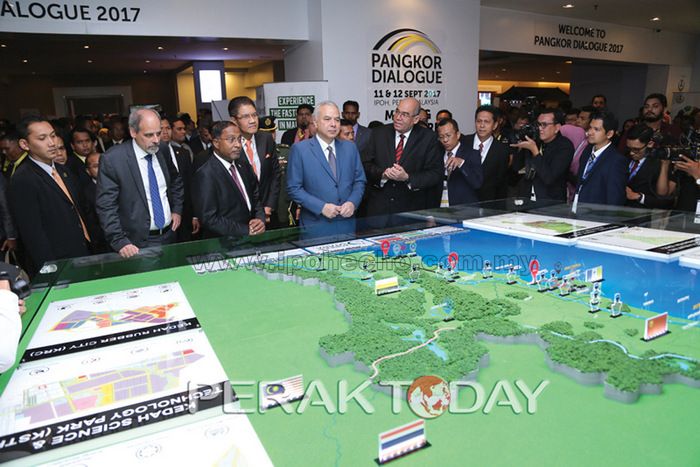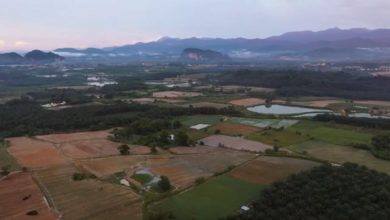Pangkor Dialogue 2017 – Some reflections


By A. Jeyaraj
I have attended all the Pangkor Dialogues (PD), formerly known as Pangkor International Development Dialogue (PIDD). I attended the first one by accident. I read in the newspaper about an exhibition at Casuarina Hotel (now Impiana Hotel) and went to see. There I met a number of my NGO friends and they asked why I was not attending the conference and invited me to join them. From then on I have been attending all PDs.


Dato’ Seri DiRaja Dr Zambry Abdul Kadir, Menteri Besar, said that PD is a move to elevate the state to a new plateau of development, one that is prosperous, happy and inclusive, where we chart our own course and be a model for the country and the region. Initially, I remember Zambry saying that since Perak is sandwiched between two industrialised states of Selangor and Penang, investors overlook Perak. He wanted to bring investors from all over the world to Ipoh and let them see what the state can offer. I am highlighting some of the speeches and wonder how they can elevate the state. The comments are based on feedback from participants and my views.
The programme of Pangkor Dialogue has a fixed format. There are keynote addresses by distinguished people, panel discussion, satellite and plenary sessions, signing of MOUs and exhibition. This year there was one week of Festival of Ideas celebration. The people giving keynote addresses are professional speakers and even if there is not much substance in what they say, they know how to captivate the audience.
The first keynote speech was by Dr Catherine Cady Coleman, Chemist and Former NASA Astronaut. She spoke about life in the space station which was informative. She gave her vision for future of mankind. How are we going to translate her views into action to elevate the state?
The second keynote address was by Jorje Jamil Mahuad Witt, former president of Ecuador. He spoke of his experience in solving problems and overcoming difficulty in preserving the forests. He stressed that there is no one solution for problems. He added that politicians are planning the future of tribal people without consulting them. The tribal people know what is best for them; let them lead the life they want. We have no right to judge their lifestyle.
In Perak as well as the country on the whole, we want to change the lifestyle of Orang Asli. Let the Orang Asli decide for themselves what is best for them. In the name of development, we must not destroy their habitat. The state government must preserve the whole of Belum. No logging must be allowed, even if it is supposed to be sustainable. The number of tourists must be restricted. This concept was highlighted in the Plenary Session on Environment. I visited Angkor Wat a few years ago and no one is allowed to stay on the site after sunset.
The Keynote address of Professor Dr Anil K Gupta, Founder of the HoneyBee Network, India was about innovation at grass-roots level. He displayed modified machinery made by ordinary people by improvising existing machinery to do their work. He emphasised that youngsters have creative ideas and it must be brought out. Institut Darul Ridzuan (IDR) should invite Dr Anil to conduct workshops to encourage our youth to come up with creative ideas. Our youths may have ideas, but how are they going to express them.
Mick Cornet, Mayor of Oklahoma City is the first mayor elected to serve four terms. He is a charismatic speaker and explained how he solved the obesity problem in the city. He rebuilt the city around the pedestrian rather than the car. A dry river in the city has been transformed and is used as training ground for Olympic athletes. He showed photos of before and after of the many projects carried out. This was achieved because the mayor is elected and not appointed. Unless we have an elected mayor for Ipoh, nothing much can be done. An appointed Mayor would be subservient to his political masters. A number of my NGO friends asked me to highlight this in Ipoh Echo.
I wonder how speeches of Dr William Tan, Neuroscientist and World Record Holder, Paralympian and Jon Jandai, Advocate of Happiness can elevate the state. They expressed their personal journey. The speech by Khairy Jamaluddin, Minister of Youth and Sports was motivational and he informed what the government was doing for the future. He emphasised that people with problems must go through the right channel, but did not say what the right channel is.
The speeches delivered at the Plenary session on Aging and Development were not relevant to the title. The moderator presented the distribution of the aging population in the country. All the speakers were from the financial sector and the first one spoke about Private Retirement Scheme (PRS) and how to contribute. I walked out of the room after his presentation. Most of the audience were middle aged and senior citizens and expected the speakers to enlighten them on the facilities that would be included for senior citizens in future development. It was more of a sales talk and the audience was disappointed.
The same could be said of the session on Nation Building. The first speaker was from the Cancer Network Society. I walked out of this as well. According to Wikipedia Nation-building is constructing or structuring a national identity using the power of the state and this is what I was expecting from the session.
The talk by Giorgio Catucci, Principal Consultant, DHL Malaysia on how he and his staff carry out their CSR programmes was interesting. He shared his experience at the Dare to be Different Plenary Session. He informed that they do not hand out charity, instead train the needy to look after themselves. The examples of projects he cited can be practised by all NGOs doing social work.
The moderator of this session was a young girl who was chewing gum which was a detraction and the lady sitting next to me commented on this. The audience expects a moderator to maintain proper decorum and chewing gum certainly isn’t decorous.
I spoke to many participants, both people I know as well as strangers and all agreed that a lot of money and time had been spent in organising this conference. They were keen to know the outcome. How are the experiences and ideas presented going to be translated into action plans and implemented? Can they be applied here? A couple of businessmen who came from KL complained that there was nothing for them to learn from the conference.
During last year’s PD, Ipoh was declared a Social Business City (SBC), the first in the region and the mayor was given the task to implement it. One year down the road I have not seen any changes in the way business is conducted by MBI. Meanwhile, during the 4th IDR Annual Research Seminar held at Impiana Hotel in April, Zambry announced that Ipoh would be known as Knowledge City. Which is it going to be?
Instead of organising PD every year, do it once in two years. Have a follow-up meeting the year after PD to review what actions have been taken. It is no point organising PDs without knowing the actual outcome. Maybe IDR can review all the PDs and come out with a report on the achievements.


